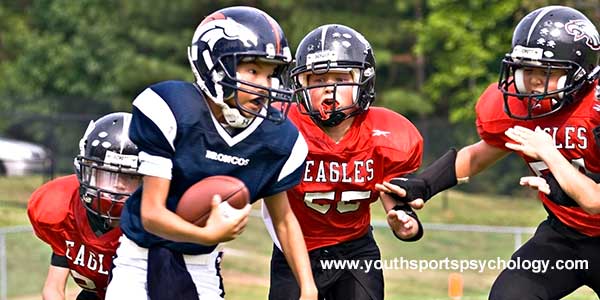
How Young Athletes Can Learn From Failure
Losses and failure can sink sports kids’ confidence–but they don’t have to.
For many football players, failure means throwing an interception in the red zone or fumbling the ball and allowing the opposing team to score.
Missing a tackle for a big yardage play or pushing the ball wide of the goal post on a field goal in the final seconds of the game might also be considered failures.
Are those mistakes necessarily failures? What if those mistakes happened in a playoff game?
Players can really hold onto costly mistakes and lost games–but that’s not a good idea.
Instead, they need to embrace the expression, “If you lose, learn.” Sometimes it may feel really difficult to do this. But losses and mistakes can make sports kids better players.
In order to learn lessons from mistakes, kids need to objectively evaluate their performance. They then need to develop a plan that helps them avoid their mistakes in the future.
Learning from losses is the mantra for University of Alabama head coach Nick Saban. Saban has accrued a record of 149-22 in 13 years with Alabama and has garnered five National Championships with the Tide.
When the team was heading into the 2019 collegiate season, Alabama wanted to avenge the loss of the previous year’s National Championship Game. In doing so, it could once again earn the top spot at the end of the year.
Alabama was ranked Number 3, and LSU was Number 2. The implications of the playoff were huge. LSU dominated the first half, garnering an early 33-13 lead. Though Alabama scored 28 points in the second half, it was not enough: LSU won with a score of 46-41.
Even though the loss may have hurt Alabama’s playoff chances, Saban seized the opportunity to learn from the loss.
“Bottom line is, especially in the first half, we didn’t play very well. We don’t want to waste a failure. There [are] a lot of lessons to be learned from things that we did and didn’t do today,” he said. “I think that everybody has got to make a commitment to finish the season the right way. We don’t really control our own destiny, but if we finish the season the right way, we can see where it takes us. We’ve been in this situation before. So I think the big thing is everybody needs to learn from the mistakes that we made today and try to get better.”
His point: Teams can learn from both wins and losses. Team members need to evaluate their performances objectively, and commit to learning from their mistakes.
How to Move Past Failure
Athletes need to get over the loss–and then redirect their focus on ways to improve their games.
After each game, they should identify two things they did well and create a plan for how they can continue to take advantage of those strengths.
Keep in mind: Kids can lose and learn. They shouldn’t dwell on mistakes. They need to focus on viewing their experience from a growth perspective. That means embracing mistakes and learning from them.
Related Articles on Youth Sports:
- How Athletes Can Move on after a Bad Game or Failure
- Fear of Failure and Youth Sports
- How To Help Young Athletes With Fear of Failure
*Subscribe to The Sports Psychology Podcast on iTunes
*Subscribe to The Sports Psychology Podcast on Spotify
The Composed Sports Kid

“The Composed Sports Kid” audio and workbook digital download program for young athletes and their parents or coach helps kids cope with frustration and anger in sports. Help your sports kids learn how to manage expectations and let go of mistakes so they can keep their head in the game.
The Composed Sports Kid system is really two programs in one–one program to train parents and coaches how to help their kids practice composure, and one program that teaches young athletes–ages 6 to 13–how to improve composure, let go of mistakes quickly, have more self-acceptance, and thus enjoy sports more!
